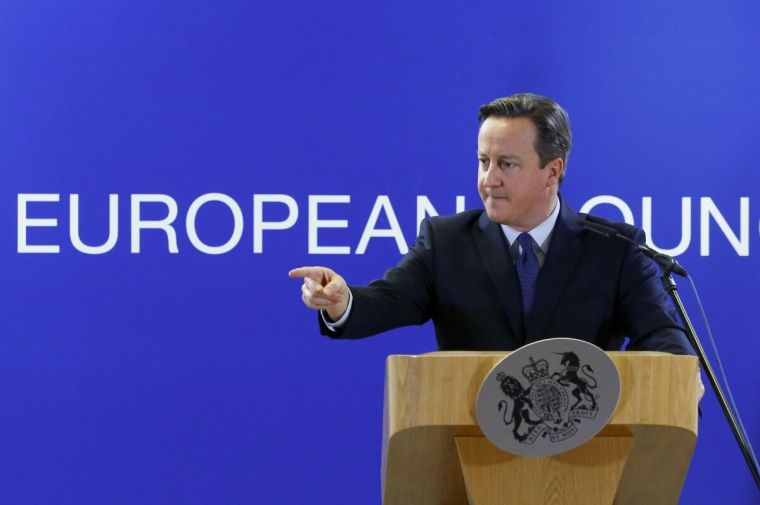David Cameron upbeat on Euro deal after leaders' meeting

Prime Minister David Cameron said on Thursday he could see a pathway to a deal to keep Britain in the European Union after EU leaders told him at a summit in Brussels they would not accept discrimination against EU migrant workers in the UK.
"Nothing is certain in life, nor in Brussels, but what I would say is there is a pathway to a deal in February," Cameron told a news conference after a substantial discussion of Britain's demands to renegotiate the terms of its membership of the 28-nation bloc before a referendum on whether to stay.
In his longest address in more than five years of attending EU summits, the conservative leader told the 27 other national leaders over dinner that if they wanted to keep Britain in, they must address his voters' concerns about curbing immigration.
European Council President Donald Tusk, who chaired the session, said he was more optimistic after the discussion that an accord could be reached in February on all four key British demands because Cameron was looking for a "fair compromise".
He said Britain's bid to deny EU migrants access to in-work benefits – an income supplement for the lower paid – for four years had caused the most difficulty.
The clearest message from the talk was that no one – including Cameron – was ready to accept discrimination, Tusk said: "This is unacceptable and for sure this is not the intention of our British partner."
German Chancellor Angela Merkel, Europe's most influential leader, said there was a widespread will to reach an agreement to keep Britain in the EU.
"We made it clear that we are ready to compromise, but always on the basis that we safeguard the core European principles, which include non-discrimination and free movement," she said.
Officials said there was no row and the tone of the debate was constructive. French President Francois Hollande said it had been "a frank and open discussion".
No ganging up
"There can be adjustments, accommodation, but European rules and principles must be respected," Hollande said, noting there were difficulties about non-euro Britain's relationship with the euro single currency zone as well as on migration.
Britain wants guarantees that the euro zone will not gang up to discriminate against the City of London financial centre in regulation. Hollande said countries outside the euro must not be allowed to prevent further integration of the euro zone.
Polish Prime Minister Beate Szydlo, whose country has approaching a million citizens living in Britain, left the meeting without speaking to reporters.
Earlier, she and the leaders of three other ex-communist central European countries said in a joint statement they would not accept any change in EU laws that would mean discrimination against their citizens or limit their freedom of movement.
For many Europeans born east of the Iron Curtain, that freedom is a touchstone of their post-Cold War liberation.
Over filet of venison with parsnip mousse and Szechuan pepper jus, the British prime minister sought to convince fellow leaders that the UK's continued membership hinges on finding a convincing solution to the sensitive immigration question.
"The levels of migration we have seen in a relatively short period of time are unprecedented, including the pressures this places on communities and public services. This is a major concern of the British people that is undermining support for the European Union," Cameron told fellow leaders.
"We need to find an effective answer to this problem."
The other leaders around the dinner table said they wanted to help Cameron ensure that Europe's second biggest economy and one of its two top military powers stays in the EU. But several stressed that a change to EU treaties was out of the question, leaving a binding promise of future change the favoured option.
Opinion polls show the number of Britons wishing to leave is growing.
After telling reporters on arrival he would be "battling for Britain right through the night", Cameron had a polite discussion that lasted just three hours, finishing shortly before midnight without the kind of "Euro-row" which have been a trademark of British negotiating in Brussels.
While he told reporters he was not backing down on the four-year demand, he also said he was looking for "solutions".
Touchstone
Cameron says he wants Britain to stay in the EU, but has hinted he could campaign for an exit if he fails to win an agreement that can reduce the influx of EU migrants, improve business competitiveness, give more sovereignty back to Britain and protect London's banks from discrimination by the euro zone.
An EU aide said Tusk wanted to give everyone a chance to speak their mind on Thursday night with a view to seeking a deal at the next summit on February 17-18.
An EU diplomat said Cameron had earlier sat in silence for more than three hours while other EU leaders debated how to deal with a wave of migrants that has divided European governments. Britain has refused to take in any from Europe.
Drawing the European Union's focus to a small part of Britain's welfare system has raised eyebrows among some leaders who are trying to hammer out a deal to house hundreds of thousands of refugees and respond to a war in Syria.
The British government hoped the dinner would signal a political will to accelerate technical talks on how London's demands can be made watertight in EU law. An agreement early next year could give Cameron time to stage the referendum in June, seen by some analysts as a good time before summer.
In an apparent indiscretion, Hollande said the target date for the referendum was June, but Cameron insisted neither he nor anyone else had mentioned the timing of the vote at the summit.











